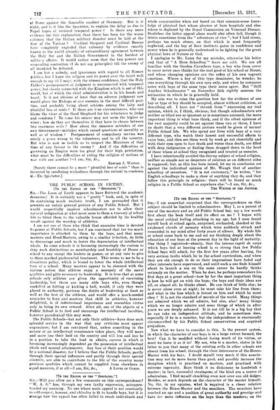THE PUBLIC SCHOOL IN FICTION.
ITo THE Emma or vim " Stwarsvoa."1
Set,—The Loom of Youth appears to have fluttered the academic dovecotes! It is certainly not a " pretty " book, and, in spite of its containing much realistic truth, I am persuaded that it presents an unfair general picture of any Public School, But I would respectfully implore schoolmasters not to allow their natural indignation at what most seem to them a travesty of school life to blind them to the valuable lesson afforded by its healthy revolt against the worship of athletics.
I am not one of those who think that excessive time is devoted t, games at Public Schools, but I am convinced that far too much importance is attached to them by the boys, and that many masters and Head-Masters, owing to a similar irfection, do little to discourage and much to foster the depreciation of intellectual ideals. In some schools it is becoming increasingly the custom to deny such distinctions as nionitorship and headship of House or school to any except the leaders in games, or at any rate to give to these marked preferential treatment. This seems to me to be a disastrous policy, which is bound to lower the whole intellectual tune of a school. Many masters appear to be obsessed with the curious notion that athletes: enjoy a monopoly of the moral qualities and gifts necessary to leadership. It is true that at some schools only athletes are given the opportunity of exercising leadership, but there are many able boys who, even though mnskilful at hitting or kicking a ball, would, if only they were placed in authority, perform the duties of leadership at least as well as the best of the athletes, and would offer a much-needed reminder to boys and masters that :skill in athletics, however delightful, is of infinitesimal importance and resembles virtue only in being its own reward. After all, one of the objects of a Public School is to feed and encourage the intellectual faculties, however paradoxical this may seem.
The Public Schools—but not only their athletes—have done such splendid service in the war that any criticism must appear ungracious; but I am convinced that, unless something in the nature of an intellectual renaissance takes place, they will more and more lose their hold on the country and will less and less be in a position to take the lead in affairs, success in which is becoming increasingly dependent jon the possession of intellectual ideals and mental attainments. Any loss of their position would be a national disaster, for I believe that the Public Schools, partly through their special influences and partly through their special clientele, are able to contribute to the life of the country many precious qualities which cannot he supplied from elsewhere in equal measure, if at am, Sir, &e., A torso or awns.


































 Previous page
Previous page